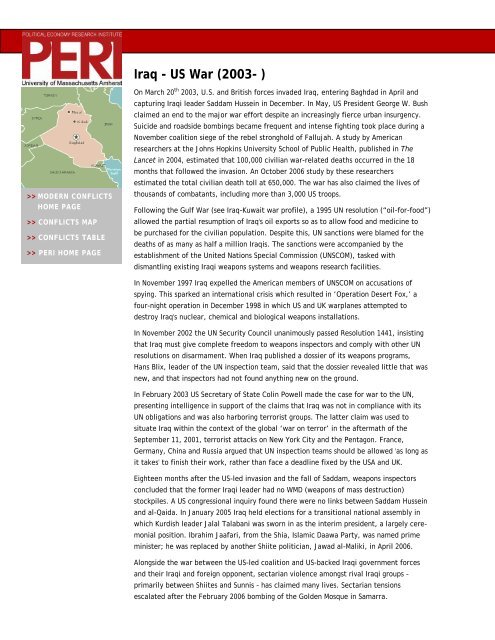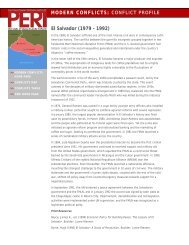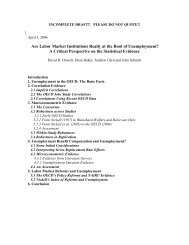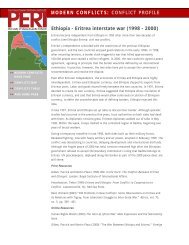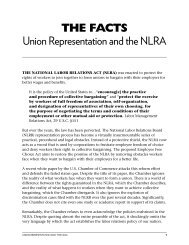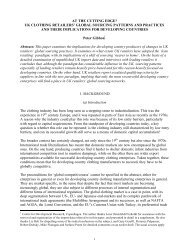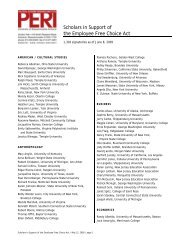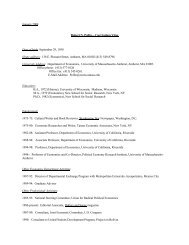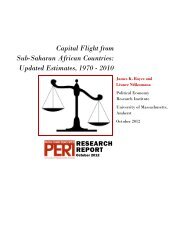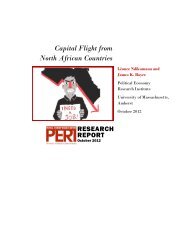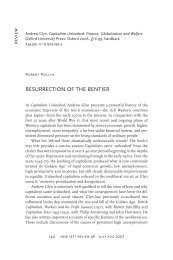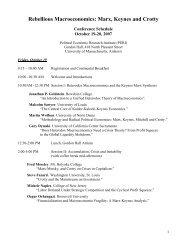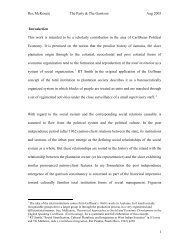War Profile â Iraq/US - PERI
War Profile â Iraq/US - PERI
War Profile â Iraq/US - PERI
You also want an ePaper? Increase the reach of your titles
YUMPU automatically turns print PDFs into web optimized ePapers that Google loves.
MODERN CONFLICTS: CONFLICT PROFILE<br />
<strong>Iraq</strong> - <strong>US</strong> <strong>War</strong> (2003- )<br />
>> MODERN CONFLICTS<br />
HOME PAGE<br />
>> CONFLICTS MAP<br />
>> CONFLICTS TABLE<br />
>> <strong>PERI</strong> HOME PAGE<br />
On March 20 th 2003, U.S. and British forces invaded <strong>Iraq</strong>, entering Baghdad in April and<br />
capturing <strong>Iraq</strong>i leader Saddam Hussein in December. In May, <strong>US</strong> President George W. Bush<br />
claimed an end to the major war effort despite an increasingly fierce urban insurgency.<br />
Suicide and roadside bombings became frequent and intense fighting took place during a<br />
November coalition siege of the rebel stronghold of Fallujah. A study by American<br />
researchers at the Johns Hopkins University School of Public Health, published in The<br />
Lancet in 2004, estimated that 100,000 civilian war-related deaths occurred in the 18<br />
months that followed the invasion. An October 2006 study by these researchers<br />
estimated the total civilian death toll at 650,000. The war has also claimed the lives of<br />
thousands of combatants, including more than 3,000 <strong>US</strong> troops.<br />
Following the Gulf <strong>War</strong> (see <strong>Iraq</strong>-Kuwait war profile), a 1995 UN resolution (“oil-for-food”)<br />
allowed the partial resumption of <strong>Iraq</strong>'s oil exports so as to allow food and medicine to<br />
be purchased for the civilian population. Despite this, UN sanctions were blamed for the<br />
deaths of as many as half a million <strong>Iraq</strong>is. The sanctions were accompanied by the<br />
establishment of the United Nations Special Commission (UNSCOM), tasked with<br />
dismantling existing <strong>Iraq</strong>i weapons systems and weapons research facilities.<br />
In November 1997 <strong>Iraq</strong> expelled the American members of UNSCOM on accusations of<br />
spying. This sparked an international crisis which resulted in ‘Operation Desert Fox,’ a<br />
four-night operation in December 1998 in which <strong>US</strong> and UK warplanes attempted to<br />
destroy <strong>Iraq</strong>'s nuclear, chemical and biological weapons installations.<br />
In November 2002 the UN Security Council unanimously passed Resolution 1441, insisting<br />
that <strong>Iraq</strong> must give complete freedom to weapons inspectors and comply with other UN<br />
resolutions on disarmament. When <strong>Iraq</strong> published a dossier of its weapons programs,<br />
Hans Blix, leader of the UN inspection team, said that the dossier revealed little that was<br />
new, and that inspectors had not found anything new on the ground.<br />
In February 2003 <strong>US</strong> Secretary of State Colin Powell made the case for war to the UN,<br />
presenting intelligence in support of the claims that <strong>Iraq</strong> was not in compliance with its<br />
UN obligations and was also harboring terrorist groups. The latter claim was used to<br />
situate <strong>Iraq</strong> within the context of the global ‘war on terror’ in the aftermath of the<br />
September 11, 2001, terrorist attacks on New York City and the Pentagon. France,<br />
Germany, China and Russia argued that UN inspection teams should be allowed 'as long as<br />
it takes' to finish their work, rather than face a deadline fixed by the <strong>US</strong>A and UK.<br />
Eighteen months after the <strong>US</strong>-led invasion and the fall of Saddam, weapons inspectors<br />
concluded that the former <strong>Iraq</strong>i leader had no WMD (weapons of mass destruction)<br />
stockpiles. A <strong>US</strong> congressional inquiry found there were no links between Saddam Hussein<br />
and al-Qaida. In January 2005 <strong>Iraq</strong> held elections for a transitional national assembly in<br />
which Kurdish leader Jalal Talabani was sworn in as the interim president, a largely ceremonial<br />
position. Ibrahim Jaafari, from the Shia, Islamic Daawa Party, was named prime<br />
minister; he was replaced by another Shiite politician, Jawad al-Maliki, in April 2006.<br />
Alongside the war between the <strong>US</strong>-led coalition and <strong>US</strong>-backed <strong>Iraq</strong>i government forces<br />
and their <strong>Iraq</strong>i and foreign opponent, sectarian violence amongst rival <strong>Iraq</strong>i groups –<br />
primarily between Shiites and Sunnis – has claimed many lives. Sectarian tensions<br />
escalated after the February 2006 bombing of the Golden Mosque in Samarra.
Print Resources:<br />
George Packer (2005) The Assasins’ Gate: America in <strong>Iraq</strong>. New York: Farrar, Straus and<br />
Giroux.<br />
Robert Fisk (2005) The Great <strong>War</strong> for Civilization: The Conquest of the Middle East. New<br />
York: Knopf.<br />
Nir Rosen (2006) In the Belly of the Green Bird: The Triumph of the Martyrs in <strong>Iraq</strong>. New<br />
York: Free Press.<br />
L. Roberts, R. Lafta, R. Garfield, J. Khudhairi, G. Burnham (2004) ‘Mortality before and<br />
after the 2003 invasion of <strong>Iraq</strong>: cluster sample survey.’ The Lancet, Volume 364, Issue<br />
9448, pages 1857-1864.<br />
G. Burnham, R. Lafta, S. Doocy, L. Roberts (2006) ‘Mortality after the 2003 invasion of<br />
<strong>Iraq</strong>: a cross-sectional cluster sample survey.’ The Lancet, Volume 368, pages 1421-1428.<br />
Online Resources:<br />
BBC News. In Depth: Conflict with <strong>Iraq</strong>.<br />
http://news.bbc.co.uk/2/hi/in_depth/middle_east/2002/conflict_with_iraq/default.stm<br />
Peace Pledge Union Online. <strong>Iraq</strong> Conflict <strong>Profile</strong>.<br />
http://www.ppu.org.uk/war/countries/mideast/iraq.html<br />
Ploughshares. Armed Conflicts Report 2005: <strong>Iraq</strong><br />
http://ploughshares.ca/libraries/ACRText/ACR-<strong>Iraq</strong>.htm<br />
Human Rights Watch. Background on the Crisis in<br />
<strong>Iraq</strong>.http://www.hrw.org/campaigns/iraq/<br />
Think Progress. Timeline of the <strong>Iraq</strong> <strong>War</strong>.<br />
http://thinkprogress.org/iraq-timeline<br />
Timeline:<br />
2002 – UN passes resolution 1441, calls on <strong>Iraq</strong> to allow weapons inspectors back in.<br />
2003 – Secretary of State Colin Powell addresses Security Council, makes case for<br />
existence of WMD in <strong>Iraq</strong>.<br />
2003 – <strong>US</strong> missiles hit targets in Baghdad; <strong>US</strong> and British ground troops enter <strong>Iraq</strong> from<br />
the south; Saddam Hussein captured in Tikrit.<br />
2004 – <strong>US</strong> hands sovereignty to interim government headed by Prime Minister Iyad Allawi;<br />
Shia militias loyal to radical cleric Moqtada Sadr fight coalition forces; Major <strong>US</strong>-led<br />
offensive against insurgents in Falluja.<br />
2005 – An estimated eight million people vote in elections for a Transitional National<br />
Assembly; Shia United <strong>Iraq</strong>i Alliance wins majority of assembly seats, and Kurdish parties<br />
place second. Amid escalating violence, parliament selects Kurdish leader Jalal Talabani<br />
as president. Ibrahim Jaafari, a Shia, is named as prime minister.<br />
2006 – Bombing of Golden Mosque in Samarra; Jawar al-Maliki replaces Jaafari as prime<br />
minister.<br />
Conflict <strong>Profile</strong>: <strong>Iraq</strong> / page 2


